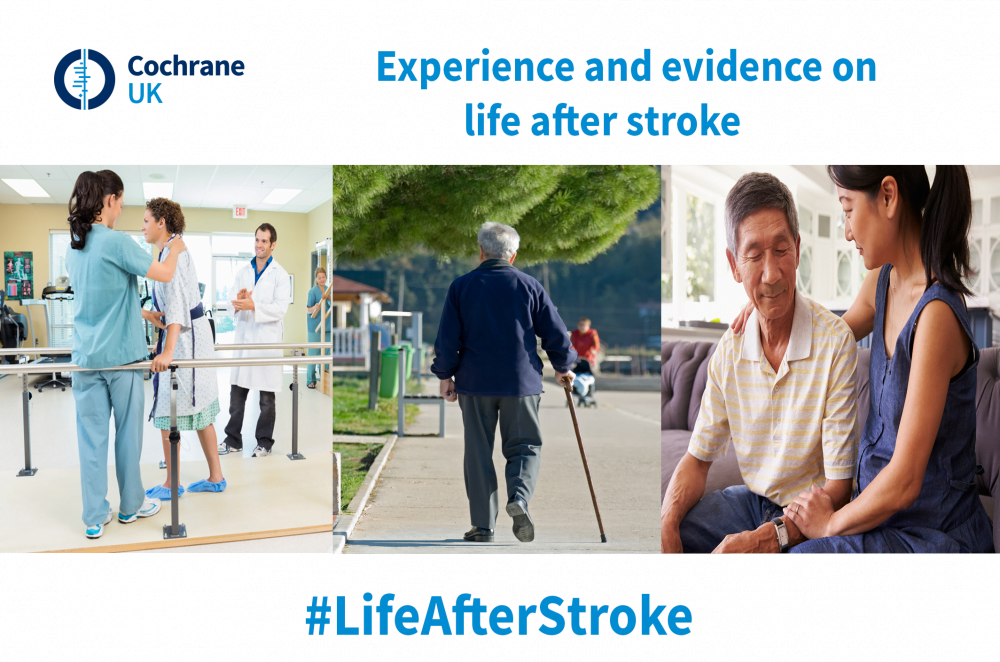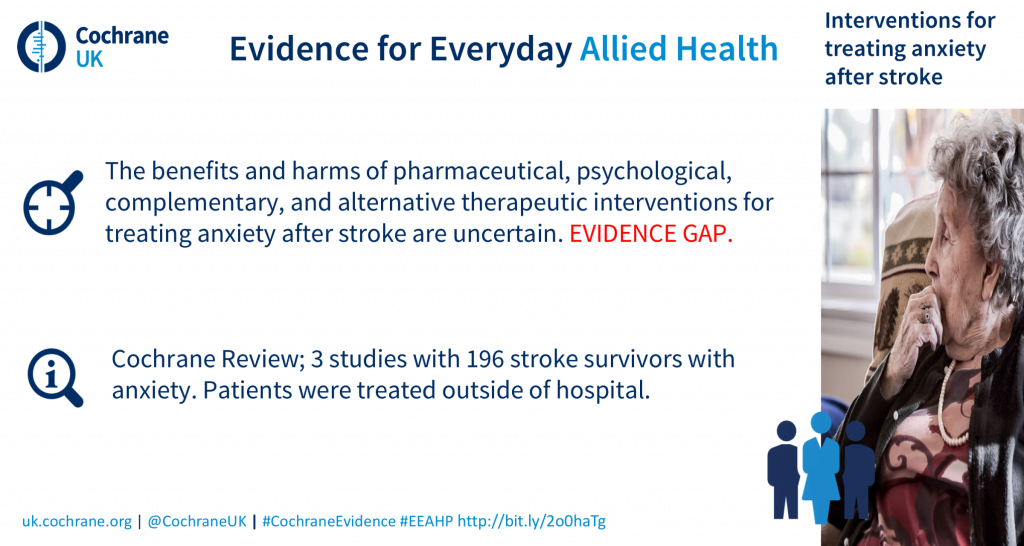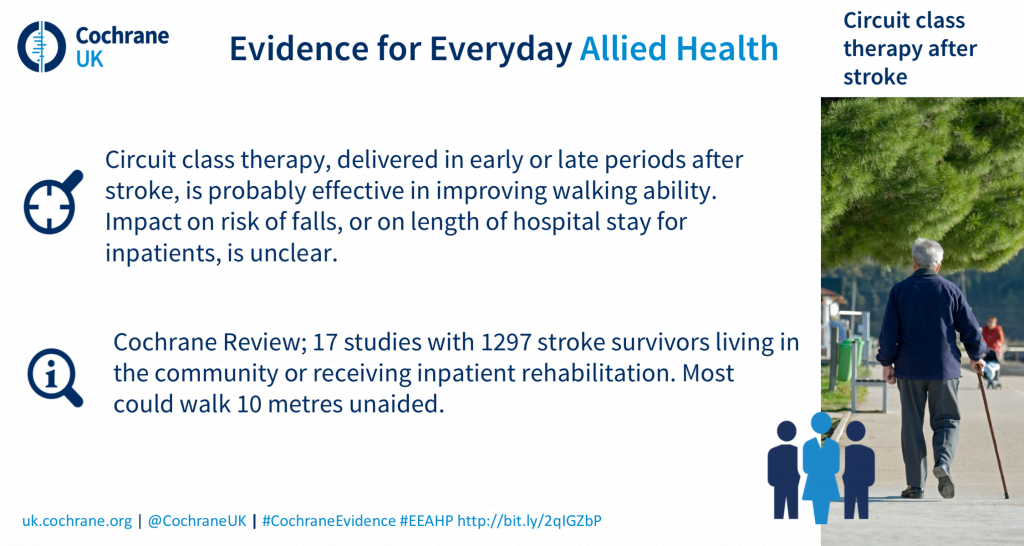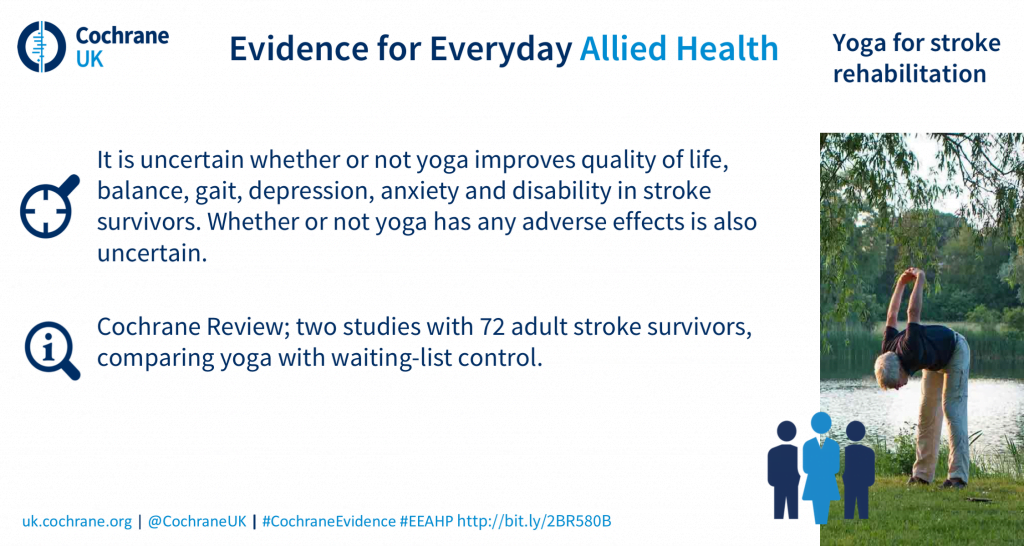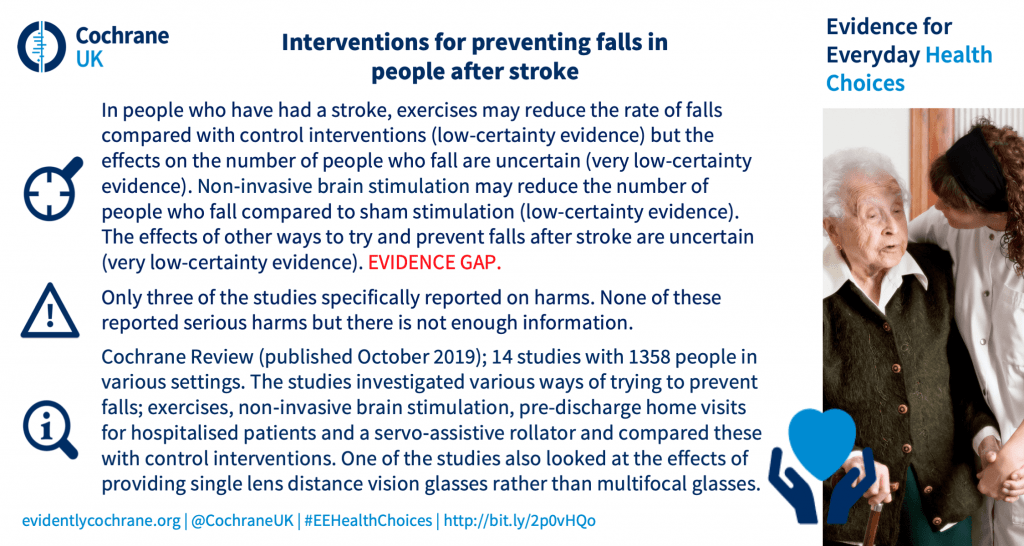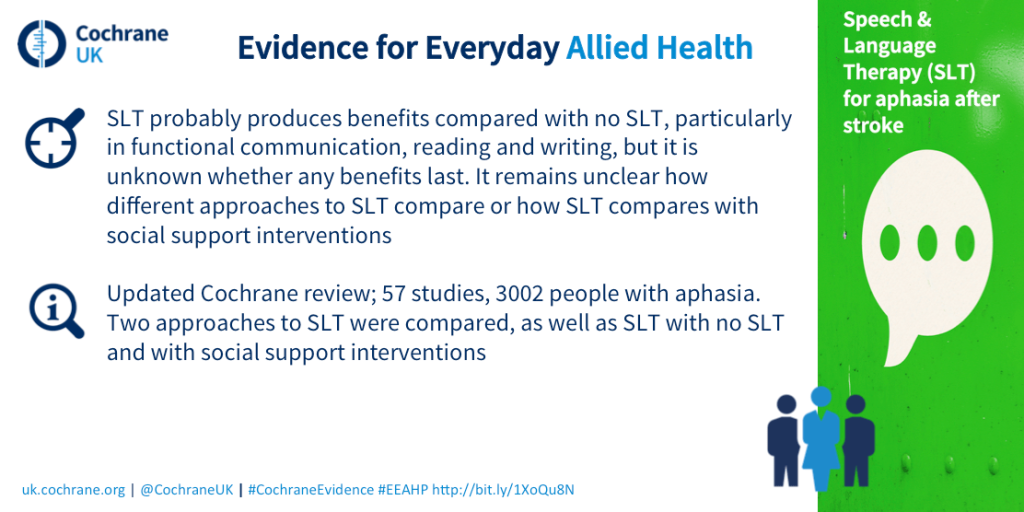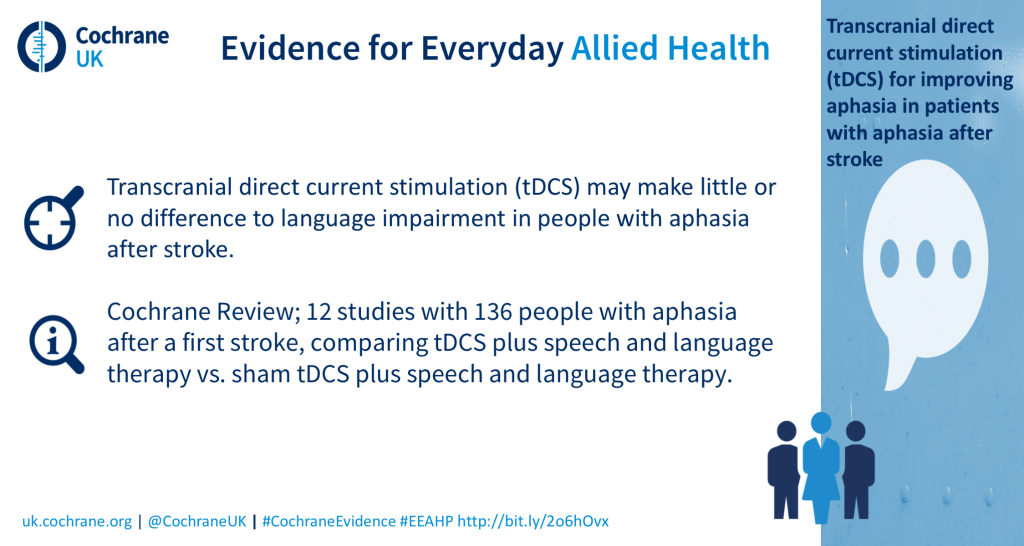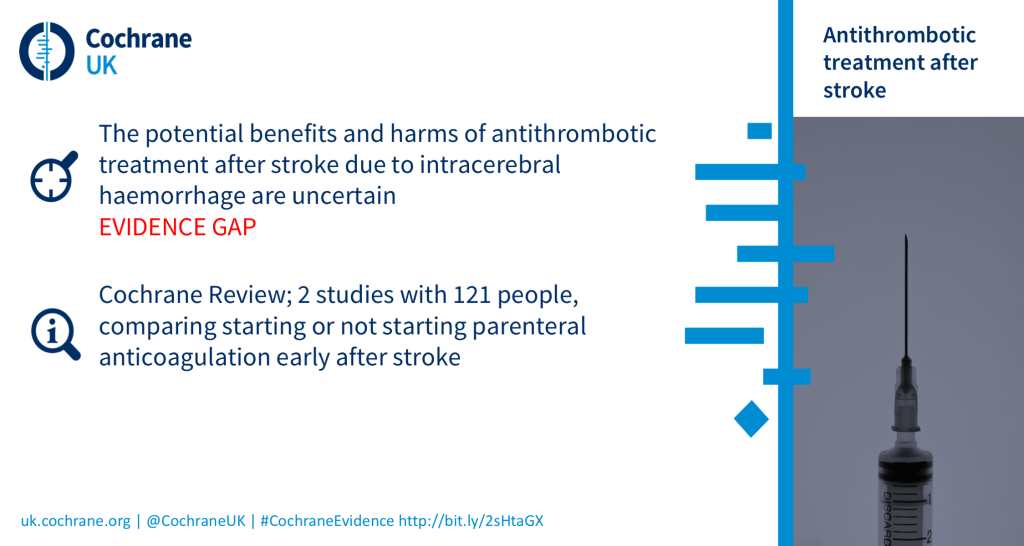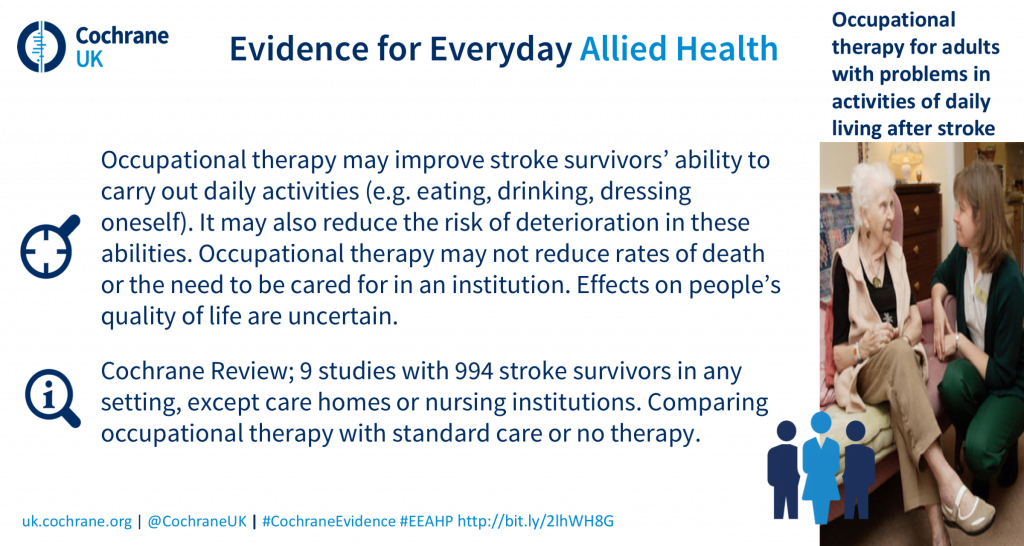Throughout March 2018, Cochrane UK ran a special series of blogs and other material on the theme of #LifeAfterStroke. On this page, you can find all of the blogs and other materials.
Research is better together: a stroke survivor and a researcher tell us why
Cognitive rehabilitation after stroke – an urgent plea for good research
Occupational therapy: enabling living, not existing, after stroke
In 2011, stroke survivors, carers and health professionals were involved in choosing the top questions they felt were most important for future stroke research. You can read more about that here. We’ve used these questions, and others, to help frame the content on this page. You can either scroll through this page, or click on the topics below to jump straight to the relevant content.
Acute phase: interventions within the first few hours after a stroke
Arm and hand recovery and function
Balance, gait and mobility
Cognitive rehabilitation
Confidence and coming to terms with the consequences of stroke
Exercise and fitness programmes
Falls prevention after stroke
Fatigue
Music therapy
Speech problems (including aphasia and dysarthria) after stroke
Stroke prevention and prevention of further strokes and health problems
Stroke services and types of care: occupational therapy; early discharge services; inpatient (stroke unit) care
Virtual reality
Visual problems
How you can get involved with research
Additional resources
[sta_anchor id=”first”].[/sta_anchor]
Acute phase: interventions within the first few hours after a stroke
Podcast: Clot-dissolving drugs for treating ischaemic stroke in the early stages
[sta_anchor id=”arm”].[/sta_anchor]
Arm and hand recovery and function
Podcast: Interventions for improving upper limb function after stroke
Blog: Stroke rehabilitation: maximizing arm and hand function after stroke
Blog: Static splinting after stroke: are therapists overlooking the evidence?
[sta_anchor id=”balance”].[/sta_anchor]
Balance, gait and mobility
Podcast: Physical rehabilitation approaches for the recovery of function, balance and walking after stroke
[sta_anchor id=”cognition”].[/sta_anchor]
Cognitive rehabilitation
Cognitive rehabilitation for memory deficits after stroke
[sta_anchor id=”confidence”].[/sta_anchor]
Confidence and coming to terms with stroke
Interventions for treating anxiety after stroke
Self management programmes for quality of life in people with stroke
Blog: Still being sexual in chronic illness
[sta_anchor id=”exercise”].[/sta_anchor]
Exercise and fitness programmes
Treadmill training after stroke
Circuit class therapy after stroke
Yoga for stroke rehabilitation
[sta_anchor id=”falling”]falling[/sta_anchor]
Falls
[sta_anchor id=”fatigue”].[/sta_anchor]
Fatigue
Podcast: Interventions for post-stroke fatigue
[sta_anchor id=”music”].[/sta_anchor]
Music therapy
Podcast: Music interventions for acquired brain injury
[sta_anchor id=”speech”].[/sta_anchor]
Speech problems (including aphasia and dysarthria) after stroke
Blog: Sorry, what did you say? Living with dysarthria (unclear speech) after stroke
Speech and language therapy for aphasia following stroke
Transcranial direct current stimulation (tDCS) for improving aphasia in patients after stroke
[sta_anchor id=”prevention”].[/sta_anchor]
Stroke prevention and prevention of further strokes and health problems
Diabetes drugs for preventing stroke and other blood vessel disease in people who have had a previous stroke or transient ischaemic attack
Antithrombotic treatment after stroke (i.e. prevention of clots after stroke due to bleeding in the brain)
.[sta_anchor id=”services” /]
Stroke services and types of care: early discharge services; inpatient (stroke unit) care; occupational therapy
Podcast: Services for reducing duration of hospital care in people with acuteA health condition (or episodes of a health condition) that comes on quickly and is short-lived. stroke
Occupational therapy for adults with problems in activities of daily living after stroke
[sta_anchor id=”virtual”].[/sta_anchor]
Virtual reality
Virtual reality for stroke rehabilitation
[sta_anchor id=”visual”].[/sta_anchor]
Visual problems
Interventions for disorders of eye movement in patients with stroke
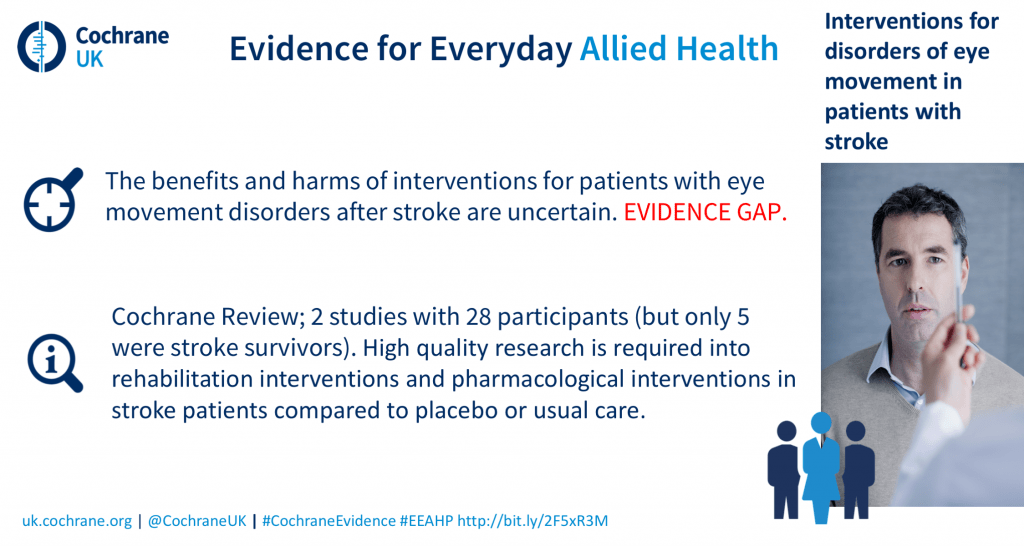
[sta_anchor id=”involve”] .[/sta_anchor]
Get involved with research
-
If you’re a stroke survivor, carer, family member, partner or spouse, you can get involved with stroke research. You don’t need any knowledge of science, medicine or research, there is no minimum time commitment and how much involvement you have is completely up to you. Find out more here on the Stroke Association website.
-
Podcast: Aspirin and stroke: how two randomised trials, with 40,000 patients in more than 800 hospitals, changed clinical practice for tens of millions of people with a stroke
[sta_anchor id=”resources”].[/sta_anchor]
Additional resources
-
All of the Cochrane ReviewsCochrane Reviews are systematic reviews. In systematic reviews we search for and summarize studies that answer a specific research question (e.g. is paracetamol effective and safe for treating back pain?). The studies are identified, assessed, and summarized by using a systematic and predefined approach. They inform recommendations for healthcare and research. on stroke can be found in the Cochrane Library.
-
Find answers to various questions about stroke on Cochrane Clinical Answers.
-
The Database of Research in Stroke (DORIS) provides easy access to evidence-based stroke research.
-
Learn more about the Cochrane Stroke group here and the Cochrane Rehabilitation field here.

